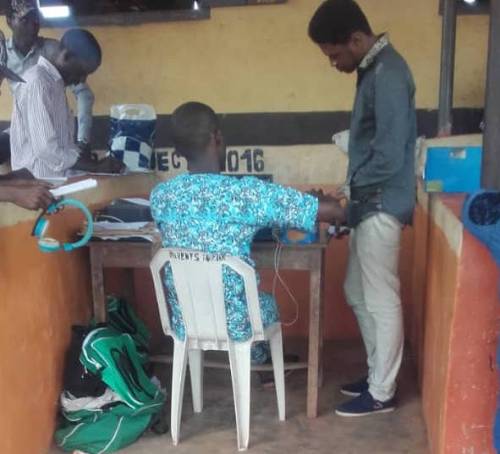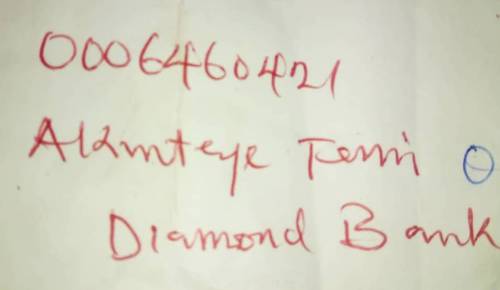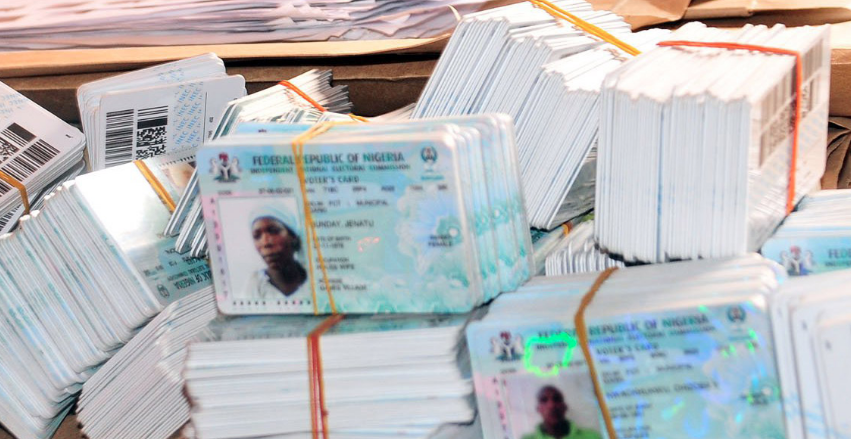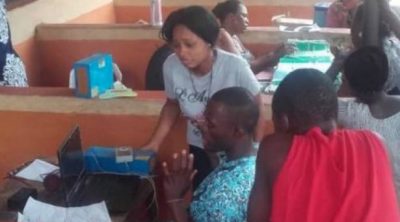In less than seven months, the Independent National Electoral Commission (INEC) will conduct a nationwide election that would allow Nigerians, yet again, an opportunity to decide their leaders. The sensitisation on how to register for and get a permanent voter card (PVC) has been loud from INEC, non-governmental organisations and even aspirants.
However, there have been numerous complaints from Nigerians about the human-induced difficulties that have made the PVC registration almost impossible for many. In this investigation by Banjo Damilola, a corespondent of Sahara Reporters, exposes the cases of bribery and extortion in select centres she visited based on hints from Nigerians.
INEC’s office at Ogbomosho North Local Government (LGA), Oyo State, has become notorious for extorting residents who come for PVC registration so much that motorcycle riders prepare the minds of their passengers before they drop them off at the commission’s office along Oke Owode road.
“They won’t attend to you except you give them money,” a rider told one of Saharareporters’ citizen reporters in Ogbomosho.
Getting to the office at about 8:30a.m on Friday, June 22, our correspondent observed that there were pockets of aggrieved people who were complaining about the conduct of the officials.
“I don’t know why they [INEC Officials] are rationing the form,” a woman who had come to register with her daughter said. “They gave my daughter the form but they refused to give me form. This is the second time I am coming here and each time, they said the form has finished for the day.”
Another lady, who was also bitter about her experience, lamented that she was not allowed to put down her name as at 8a.m that she got to the office. “I was told the list is full,” she said.

Registration ongoing at a centre
Our citizen reporter and her friends then made attempts to get registered at the same centre but true to the complaints of others, they could not.
The citizen reporter approached one of the officials, Akinteye Femi, to lodge complaints about their plights but the conversation gradually deviated into a negotiation.
The negotiation… ‘won’t you give us something?’
After a long tale on why INEC was reluctant to register students, Akinteye assured our citizen reporter that he could ensure she and her colleagues got registered if they would get to the office as early as 6:30a.m and provide “man power”.
“We do have problems with students,” Femi began, “most especially the LAUTECH students. If I can show you the permanent voter cards that we have in our store now, it is more than thousands [sic] which the larger number of those cards are students cards. Those ones that have finished, even those that are still in school, they did not come and collect at all because they thought it is not useful to them.
“Let me just tell you, average of the students are not indigene and during election, there will be holiday for them to go back to their various places to go and vote. It is just better for them to go back home and register where they reside. Even if they register here, it is not useful for them. They might use it for other purpose but they cannot use it to vote because they will not be here during the election.
“If they are indigenes, let them go back to their various wards” he said.
“How can you help us because the students have to go to class… if there is a way you can help us,” our citizen reporter cut in. “We can get a bus to convey us here, maybe you’ll give us a day.”
He agreed that he could help before he went into another tirade of excuses on his limited capability to attend to a large number of people. He then called in another colleague, Mr. Toyin, to join the conversation.
“She wants us to assist them. She said when her people come, we don’t attend to them,” he told Toyin.
The conversation seemed to have ended with the agreement that the students should come as early as 6:30am so that they could be attended to before rush hour but as our citizen reporter made to leave, Akinteye promptly added: “And manpower or won’t you give us something? Are you not a student?”

A screenshot of the details of the account people were asked to pay money into
‘N5, 000 is small for 20 people but I will help you’
Akinteye and Toyin blathered on about how the citizen reporter had been evading the ‘money discussion’.
“That was why I have been asking if there is any other thing we will need to do.”
“But you know now,” Akinteye said before Toyin interjected with a hysterical laughter: “He was suggesting it to you but you kept evading.”
Akinteye continued: “You know now but I will not tell you this is what to bring. You are students but you know what you’re supposed to do.”
“Okay, what is the range? Just tell me the range if it is something I can afford.”
“What do you have in mind like a range?”
“I don’t know. I don’t know the range. I am talking about 30 people. Let’s just say two buses.”
“Are you saying you want to do it per head or you want to do it collectively,” Akinteye asked.
“Collectively,” the reporter said.
“Ehn… so what range do you think?
“I have no idea”
The haggling went on for few more seconds and seeing that the citizen reporter would not name a price, Akinteye and Toyin went out to discuss.
“As I was saying, how much do you think can”? Akinteye said immediately he re-entered his office.
Akinteye had thought the reporter was working for a politician so he pushed to know if there was a “hidden agenda”.
“… I don’t want any hidden agenda. You have to come plain. This is our work and our work is not like this, we normally come straight. If there is anything there, let us know. Tell us… you understand? If there is anything behind it… we might even help more than your expectation when you come out plainly.
“Is there any sponsor?” he finally asked after minutes of meandering.
“How do you want us to believe that there is no one behind it?” Toyin queried. “So that something that you said you are going to bring, who is going to be responsible for the money?”
The reporter tried to persuade them she was doing it out of patriotism. “It is community service. It is something we have been doing. We do different campaigns on drugs and drug abuse. So we can always sponsor it.”

A collection of PVCs
Toyin seemed unconvinced of the reporter’s story but the heightened inherent greed in him made him push further. However, he became more cautious of his words.
“We don’t commercialize our work,” Toyin attempted to be pious “but as far as you want to come in a group and for your own group and for easier something, that is why. And you are the one that even say [sic] that what should you bring because it might become another thing. We might hear another thing outside now that INEC, if you go there, they are collecting money and we are not commercializing our work.”
Akinteye and Toyin refrained from giving a price; instead, they urged the citizen reporter to give them an amount she could afford.
“What about N3000 for 20 people?” the reporter suggested.
“That is just too small,” Akinteye said.
“You just say the amount,” she urged the two officials.
“No, ‘jerk’ it up. We don’t want to name the price for you.”
“Tell me what you want… you know, me, I just mentioned a price now.”
“Jerk it up, jerk it up. If we mention N20,000 now, you will say it is too much because you are students but jerk it up”.
“Okay, how about we make it N250 per person; for 20 people that will be N5000?”
“How much?” Akinteye, who had been quiet for few minutes, asked.
“N5000”, Toyin replied.
Suddenly, the two INEC officials got suspicious of the citizen reporter’s phone that had been visibly up since the negotiation began. Akinteye looked through the phone to be sure she was not recording but somehow he missed the taped audio staring right into his face.
“N250 per person. That is N5000 for 20 people,” the reporter quickly redirected the conversation back to the negotiation.
“Don’t let me talk again. What I will do for that short period of time is not what it [the N5000].”
“Really?”
“Honestly! But don’t worry; let’s just make it like that.”
They received N2000 as initial payment for the 20 students that would later come to register.
‘A community financed its registration’
In the bid to convince our citizen reporter that incentivizing officials to do their duty is not uncommon, Akinteye narrated the story of a community that paid to have a registration centre.
“Something happened last week, some members of a community came here… they wanted us to bring the system to their place and register their people.
“I met with my boss and he said ‘okay, will they be able to finance it?’ And they said yes… because we cannot just take our system out like that; we will need ink, we will need some other materials and they agreed and we did it for them. It was even last week Thursday; I was the one that went there to register. I registered almost 100 in a day.”
N200 per registration is small for Akinteye
After the initial payment, 20 people were conveyed to the centre for registration. They all registered with ease; the process took less than 5 minutes to register a person. Not only were they promptly attended to — a thing that had been hitherto difficult to do — they were also given laminated Temporary Voter Cards (TVCs).
However, there was a need to pay Akinteye another visit. The citizen reporter had recorded only audio of the initial conversation with Akinteye. There was no evidence that any payment was made; if that went to press, the audio could be denied.
On Friday, June 29, the citizen reporter in company of another reporter paid Akinteye a visit, this time the conversation was captured in video.
“Those who are giving me the money want to know if we can have it at N200 per person,” the reporter asked.
“It is not possible” Akinteye said.
The reporter made pleas to have Akinteye reduced the cost to N200 per person but he insisted he could not have the price reduced.
“It is not possible,” he said repeatedly.
Akinteye collected another N5000 for the second batch of 20 people.
The reporter asked for his bank account details for ease of future payment — a request he gladly obliged.
How INEC Officials Sell PVC Registration Slots To NigeriansHow INEC Officials Sell PVC Registration Slots To Nigerians
The almighty list
Somto Ebele angrily left the INEC registration centre at Oke-Odo, Alimosho LGA in Lagos, having waited for over seven hours, only to be told that he would yet again not be registered.
“I have been here since 5a.m. This is unfair,” Ebele protested but he was quickly shut down by the gang who had frustrated his two attempts to register.
Had all the 50 people handed the registration forms Arrived at Temidire Primary School, the registration centre, earlier than 5a.m, Ebele’s protest would have been needless; but they did not. In fact, some strolled in hours after Ebele, paid between N500 to N1000 — depending on how long they were willing to wait— and took a spot ahead of him.
It was 11:10am on Friday, May 18. The INEC officials had just reeled out the 50 ‘lucky’ people that would be registered. Unfortunately for Ebele, he was number 60 on the list, which meant he would have to go back another day if he still has the motivation to register.
The struggle to secure an early spot on the arrival list in many registration canters is a dire battle. Residents leave their homes as early as 4a.m to put down their names at the registration centers. However, in some centres, earlier arrival does not guarantee that one would get registered because the names on the list would have exceeded the threshold INEC officials were willing to attend to in a day, even if one gets to the centre as early as 5a.m like Ebele.
Temidire registration centre is one of such centres. Thugs in the area formed a ring around this list and extort ‘impatient’ residents who wish to register. Two men — Wale and Agunbiade Rahman — are the kingpin of the racket. They charge as much as N1,500 in exchange for one of the fictitious names they had cramped into the list.
Although, it could not be established if the INEC officials at Temidire centre benefited from this racket, it was however observed that they were aware of the racket but chose to ignore multiple complaints and protests from the people.
How the racket works
Onyewe Oluebure, a light-skinned man who seems in his 30s, strolled into Temidire centre at about 7:30a.m. He did not go for the list, which was already over a hundred names long. He had negotiated a slot with Wale’s group. He had bought ‘Number 5’ on the list — Abiodun Ajasa was the name written on Number 5 — but after waiting for about two hours and the INEC officials had still not arrived, he got impatient and went back to negotiate for the first name — Ohamaigor Ugochukwu — on the list.
Wale ordered Oluebure to meet with Rahaman with an instruction to pay extra N500 for the ‘upgrade’.
“See that man, go and meet him. Tell him from me, that he should give you Number 1. You will give him N500.”
Just before Oluebure came for renegotiation, three ladies who had made prior arrangement with Rahman arrived. Numbers 25, 26 and 27 had been reserved for them.
Rahman gave them their pseudo names and explained how the fraudulent practice worked.
“You are on Number 25 and your name on the list is Babatope Ifeoluwa,” he told one of the ladies. “You are Number 26, Usman Adeola; and you are 27, Dada Tosin.”
“But wait, is that the name we will use to register?” the lady given Number 25 asked.
Rahman explained to them that the pseudo names are only needed to get the INEC registration form. Once they have the forms, they can fill in their real names, Rahaman tutored the ladies.
“The INEC official will call out the first name and he expects that you call out the second name to be sure you’re not collecting the form for someone else. When he calls Babatope, you will respond with Ifeoluwa. You will collect the form and them go ahead to fill your real name on the form before you go for capturing.
Circumventing the process
One of the INEC staff had announced during the pre-registration sensitization that residents whose age is in dispute would have to provide birth certificate for verification.
“For those of you who just clocked 18 or look younger than 18, please know that you will have to bring your birth certificate,” he warned.
So, it came as no surprise when he asked a young man who looked much like a teenager to show his birth certificate as evidence that he was 18, the legally acceptable age to participate in the election process.
Luckily for the ‘boy’ but bad for the process, the young man was one of Rahman’s clients who had paid to have his registration fast-tracked. He went to Rahman who then had a friendly conversation with the same INEC staff who had earlier refused his boy a registration form. Without any hesitation, Rahman got the form and handed it over to his client.
Underage voting has been one of the major challenges of Nigeria’s electioneering process. INEC Chairman, Mahmood Yakubu, had defended the sanctity of the National Voters Register on May 6, insisting that no underage persons were registered.
Speaking on the alleged underage voting in Kano, he said: “Given that the Register was substantially not used to accredit voters before voting [in Kano], it is logical to conclude that if under aged voting occurred in the election, it was not due to any presence of underaged registrants on the Register of Voters.”
Unfortunately, not only could the act observed at Temidire registration centre “create doubts in the minds of citizens about INEC’s preparations for the forthcoming general elections”, as correctly pointed by the commission’s boss, it also proved that children might indeed be voting.
Some animals are more equal
To get on the fast track lane at a registration centre in Sonmore College, Ifako-Ijaye LGA, ‘tipping’ the INEC staff is a sure way to go. Although there was no instance of paying to get on the list, our correspondent observed that people who incentivized the INEC officials were promptly attended to and issued laminated Temporary Voter Cards (TVCs) instead of the plain paper given to others.
However, one of the officials who spoke to Saharareporters denied that preferential treatment was given to some people.
He said those who had laminated TVCs asked for the service and that they only assisted them to laminate the slip from a nearby centre.
This act was also observed at the Ogbomosho North INEC office. Those who had ‘incentivized’ the officials got laminated TVCs.
All centres are not the same
This reporter walked into a registration centre on Simpson Street, Lagos Island, at about the 12 noon expecting to be told the list was filled as it were the case in previous centres but surprisingly, the atmosphere — including the officials — was friendly, and there was no list.
“Good afternoon. I want to register for a PVC,” this reporter said to one of the officials who was sorting a pile of files.
“Have you registered before?” he politely asked, stopping what he was doing to attend to me.
“I have but when I was in school and I cannot find the TVC again”
“You should go and check properly before but if you’re sure you cannot find the TVC again, I will give you a form to fill.”
For another 10 minutes, this reporter observed how residents came in and got registered with ease.
This report first appeared on SaharaReporters


